For a camping enthusiast, the biggest concern about winter adventures is a reliable and efficient heating system that does not put a strain on their budget.
Today, we will explore one of those tent-heating options in detail and how you can use it to manage heat for tent camping. From how its combustion works to the selection of the right diesel heater for your needs, this section will answer most of your queries one by one.
Benefits of Using Diesel Heaters for Tents
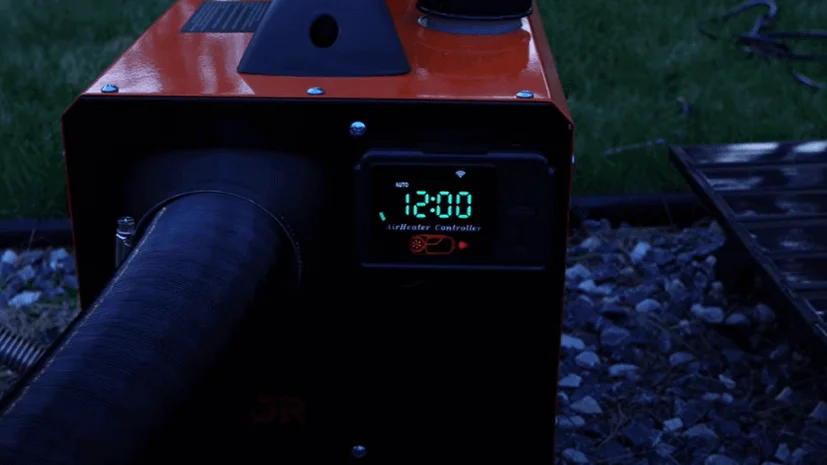
Today, diesel remains a preferred source of energy for several construction, mining, transportation, hospitals, and marine apparatus. Here’s why diesel equipment can be a good choice as a tent-heating option as well:
Efficient Heating in all Weather Conditions
No matter what the mercury readings say, a diesel heater will keep you warm through and through. These heating systems can keep your vans and tents cozy in every weather condition.
Moreover, the heater’s casing comprises durable material that can withstand both external and internal wear and tear.
Cost-Effective and Fuel-Efficient
A diesel tent heater can generate lots of heat using less fuel within no time due to its high compression rating. Moreover, once you reach your preferred temperature, the heater might require very little amount of fuel to maintain it.
Natural gas might appear cheaper to many, but in actuality, diesel translates into higher cost savings. Technically speaking, the higher the energy density, the more energy is stored in its mass. Therefore, diesel runs for a longer time than the same volume of gas.
Safety Features and Reduced Fire Risk
For many, safety is one of the biggest concerns when picking any heating system for adventures; are diesel heaters safe to use inside a tent or the campervan?
Such heating devices are absolutely safe to use inside the van, provided you follow all the safety precautions.
Additionally, a portable diesel heater is also safe to put inside your camping tent, even more than gas-powered ones. Gas heaters depend on spark ignition, whereas diesel ones use compression ignition. Fuel ignition using compressed hot air minimizes the fire risk that a spark constitutes.
Quiet operation for a peaceful night’s sleep
Most users may tell you how their heater keeps making a ticking sound throughout the night. However, that is not the case anymore because the market offers several quieter models; you only have to find one. If you have an older model, you can consider purchasing a silencer for your exhaust.
Versatility and Portability
The list of benefits offered by diesel tent heaters goes beyond the walls of your tent or campervan. You can make use of their efficient fuel consumption and cost-effective operation in your living room and garage.
You will never regret investing in a portable diesel heater as it is reliable and cuts down your energy consumption costs whether you are in a van or your house.
How Diesel Heaters Work in Tents
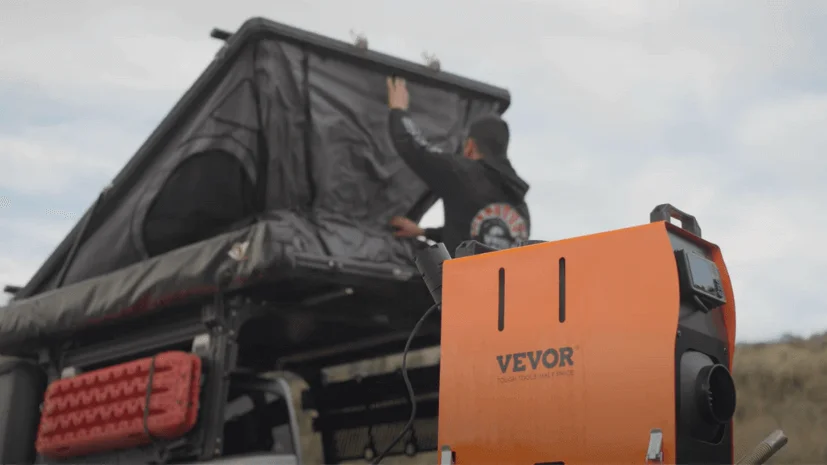
Before moving further, it is essential to explore the inner workings of a diesel tent heater to have a better idea of how it operates.
How Does the Combustion Process Work?
These campervan heaters run by igniting diesel in a combustion chamber, which then transfers heat by circulating it through air or water.
The combustion chamber is an enclosed and safe space that burns the fuel without leaking fumes or unpleasant odors. The air required for combustion is blown into the diesel heater via inlet pipes and a fan. Then, the dry heated air is expelled outside through outlet pipes.
Components of a Diesel Tent Heater
The knowledge of a diesel heater’s assembly might come in handy while troubleshooting your heater in the future:
- Air Inlet and Outlet Pipes
- Combustion Chamber
- Heat Exchanger
- Fuel Tank, Fuel Pump, and Filter
- Exhaust System
- Control Systems and Temperature Regulation
This system monitors parameters such as fuel flow, air intake, and combustion rates to ensure that the proper temperature is maintained.
The heater’s safe and effective functioning can be guaranteed by modifying these settings. Modern diesel heaters use advanced control algorithms, such as PID controllers, to ensure temperature management. It reduces energy waste and avoids overheating.
How Important is Ventilation?
Whether you talk about a portable diesel heater for a tent or a heater for your van, ventilation always comes first. The harmful gases produced as a result of activity inside the combustion chamber pose serious health risks.
To prevent fume buildup, ensure that your area has smooth airflow and ventilation. Moreover, check ducts and vents regularly to spot any signs of corrosion and damage that can impede airflow.
Types of Diesel Heaters for Tents
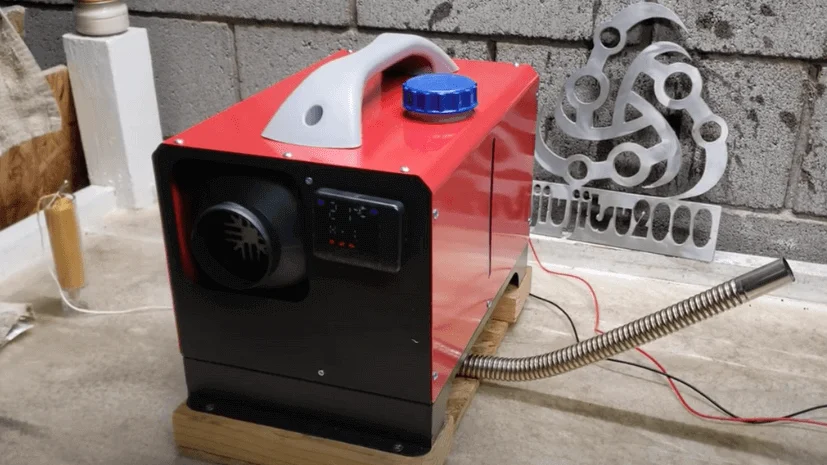
Here is a list of tent-heating options for you to consider this winter:
Portable Diesel Heaters
Portable diesel heaters are self-contained units that come in various sizes to suit different space requirements and are easy to carry around.
Pros
- Can work equally well for tents, vans, garages, and homes
- Can be left at home for the chunk of the year that you don’t need them
- Affordable and silent tent-heating options
- Create less moisture in the air
Cons
- Need setting up every time you shift them to a new location
- Don’t recirculate warm air
- Are vulnerable to wear and tear under harsh conditions
Wall-mounted Diesel Heaters
As the name depicts, these heating devices cling to a wall and heat the space.
Pros
- Can fit in small places and cabins
- Saves you considerable space on the floor
- Don’t produce a lot of noise
Cons
- Need to be removed from the wall to be carried around
- Can’t warm up a large van or tent
- Might take longer to reach the desired temperature
Roof-mounted Diesel Heaters
A rooftop tent heater is something that you place outside your tent near the rooftop where the combustion takes place, and the heat enters the tent via a tube.
Pros
- Does not cover space inside the tent
- Heats the space with clean air
- Fuel-efficient
- Consumes minimal electricity
Cons
- Covers more space in gear storage
- May be too noisy for some user’s liking
- Require automotive diesel
Multi-fuel Diesel Heaters
Multi-fuel heaters use a mixture of diesel and kerosene or the two separately to heat your van or tent.
Pros
- Ability to run on multiple fuels
- Easy to install
- Fuel-efficient
- Comes in various sizes
Cons
- Highly flammable kerosene
- The Unpleasant smell of fuel
- Harmful for pregnant women, older adults, asthma, etc.
Selecting the Right Diesel Heater for Your Tent
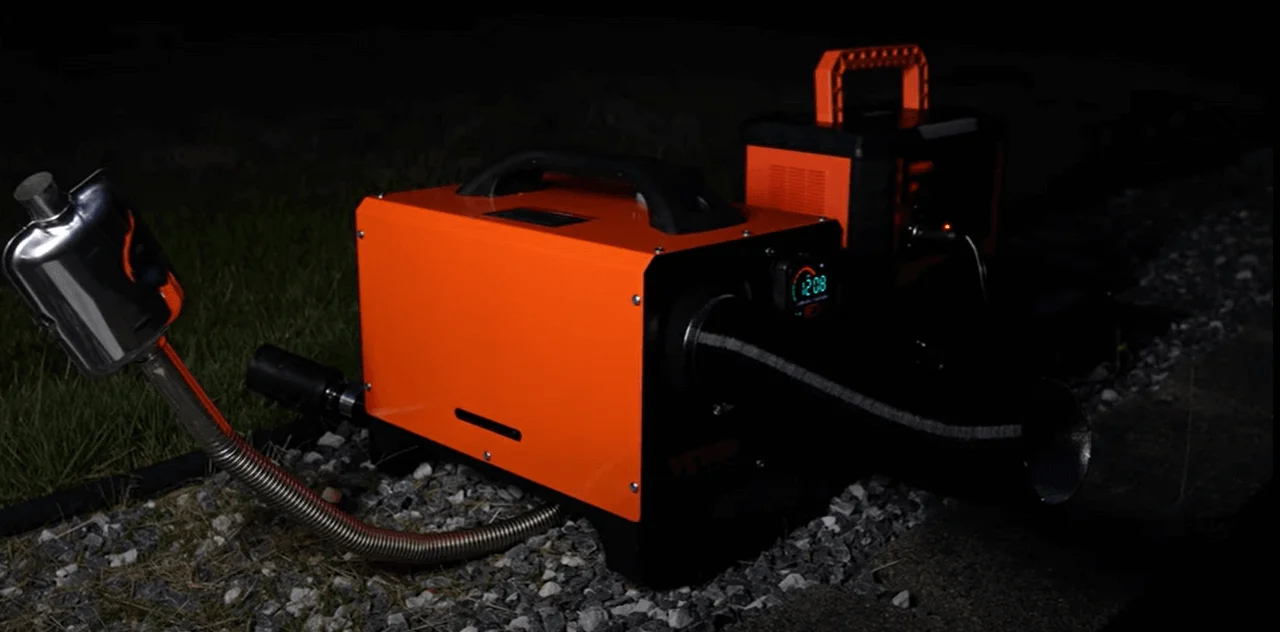
With so many options available, it can be hard to decide which diesel heater works for you. Here’s our checklist that can help you make an informed choice:
Consideration of Tent Size and Insulation
Your tent’s specifications will help you shortlist your options among diesel tent heaters. Choosing a huge heater for a small camping tent will not only cover most of your space but will also increase fire and suffocation risks.
Additionally, your tent must be an insulator because the heater will stop burning after reaching an optimum temperature. Poor insulation will cause the temperature to drop and the heater to restart, wasting fuel.
Weather conditions and intended use
The weather conditions matter when buying a heater for your adventures, especially if you place it outdoors. For regions with unpredictable weather, a portable diesel heater is a better choice than a rooftop tent heater. Being exposed to harsh conditions affects the longevity of the device.
Budget and Fuel Availability
Expensive doesn’t always mean good, so don’t strain your budget while buying a heater. There are several budget-friendly options available on the market that outclass the expensive ones.
However, purchase price is not the only thing to consider when budgeting; include fuel prices also. If your fuel is not easily available, expensive, or runs out quickly, you will regret your decision at the end of the month.
Noise Level and Power Source
An average diesel heater requires a 12V power supply, but its consumption of electricity is the bare minimum. Massive ones may require even more voltage. Therefore, while picking a diesel heater for yourself, you might want to consider how much voltage can your power source supply.
Moreover, if you are sensitive to sounds, you should consider purchasing a high-end diesel heater that produces little to no noise.
Environmental Concerns
If you intend to buy an eco-friendly machine, a diesel heater might be a good choice. The emissions from a diesel heater are more eco-friendly than those of other tent-heating options. Moreover, burning diesel produces lesser levels of carbon than coal or oil, making it a cleaner fuel choice.
Diesel Heater Accessories for Your Tent
Diesel heaters are not standalone devices, as they need a complicated assembly of small and big accessories to function properly.
- Fuel tanks and connectors: Diesel heaters need a fuel tank to provide them with a constant supply of diesel to burn. Moreover, you will need connecting equipment to join the fuel source to the heater.
- Insulation and heat distribution: Add a layer of insulation in the exhaust ducts to eliminate condensation, reduce energy waste, and decrease noise.
- Remote control: You might also need a remote control to adjust the temperature from the comfort of your bed.
- Power sources and compatibility: To ensure smooth electrical connections, you can use the voltage from your van’s battery or purchase a portable power source compatible with your heater’s requirements.
- Thermostats and timers: A thermostat and timer are necessary for the efficient functioning of the diesel heater as they monitor the temperatures and automatically switch the heater off when needed.
FAQs about Diesel Tent Heaters
Can I use a diesel heater in any tent?
Yes, one can use diesel heaters in many types of tents. Since diesel heaters require ventilation to prevent harmful fumes from building up inside, it is crucial to consider the size of the tent, ventilation system, and manufacturer’s guidelines.
What are some common issues with diesel heaters, and how can I troubleshoot them?
Common issues with diesel heaters may include fuel supply issues, ignition issues, irregular heating, or noise. To troubleshoot, check the fuel supply, clean the fuel filter, ensure the heater is stable, and ensure fuel quality. If the manufacturer’s guide is followed, most problems can be resolved quickly.
Are diesel heaters safe to use in tents?
Given optimal ventilation, diesel heaters are safe to use in enclosed spaces like tents, providing compliance with the manufacturer’s guidelines for safe use. The heater must be placed in such a position where there is no danger of flammable items.
Conclusion
There is no way you cannot consider buying a diesel heater for your tent or campervan if you are an adventurer. These heating devices have a long life and offer maximum return on investment.
I hope the article resolved all the queries you need to decide whether or not to invest in a diesel tent heater this winter.
If you want to explore more and have a specific budget in mind, VEVOR has some amazing options for you. You can visit the website and shortlist some items that suit your preferences.

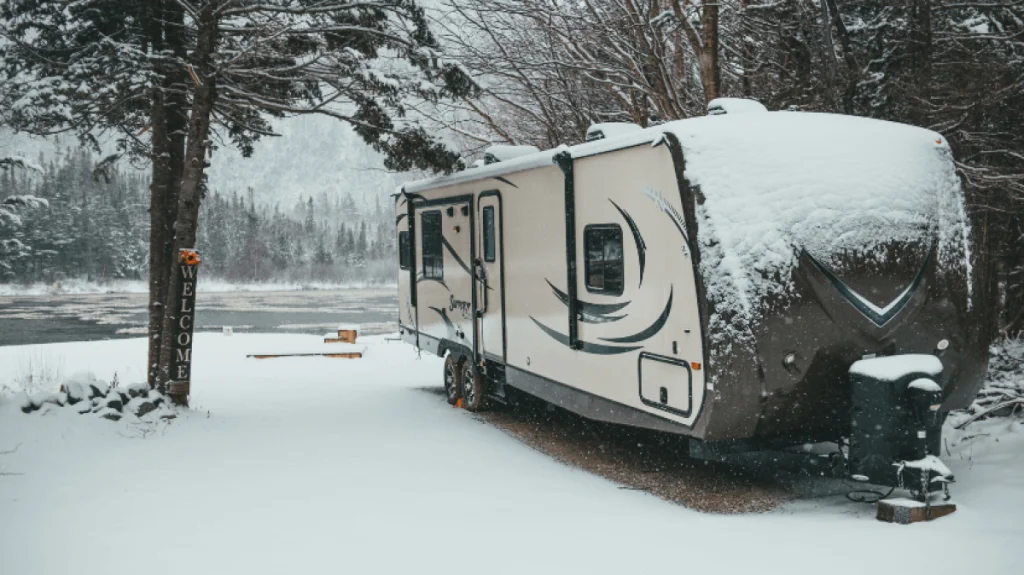
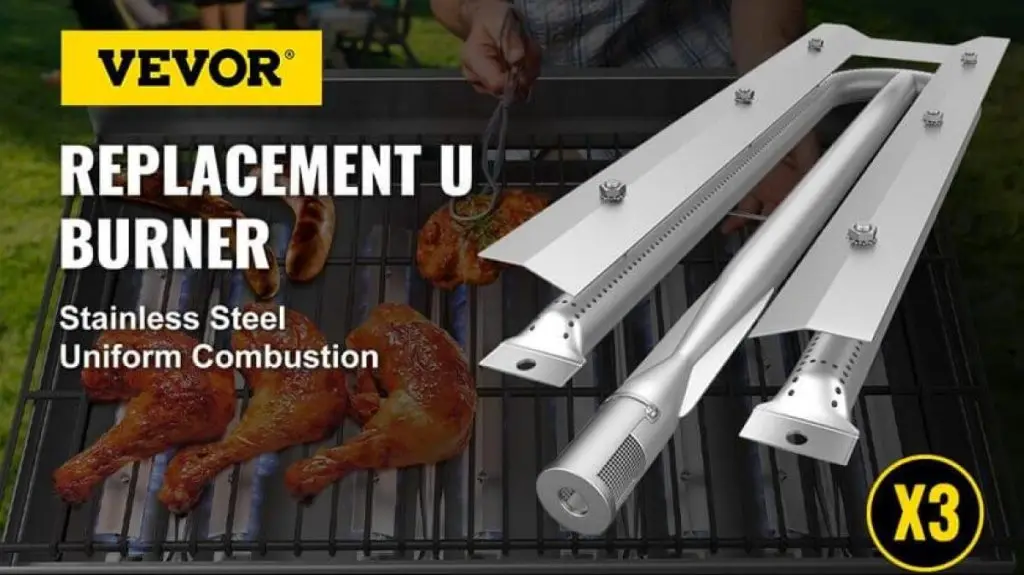
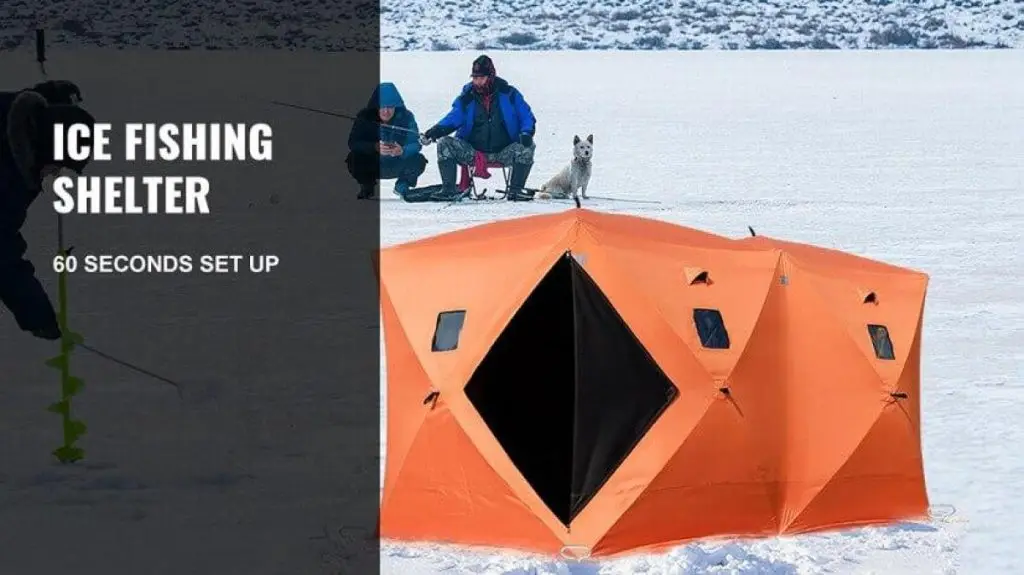
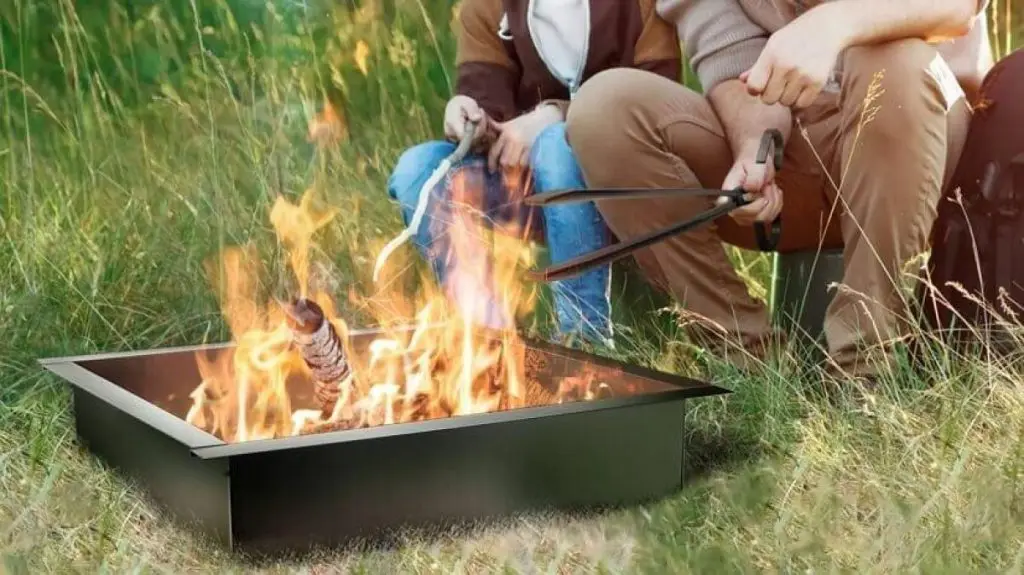
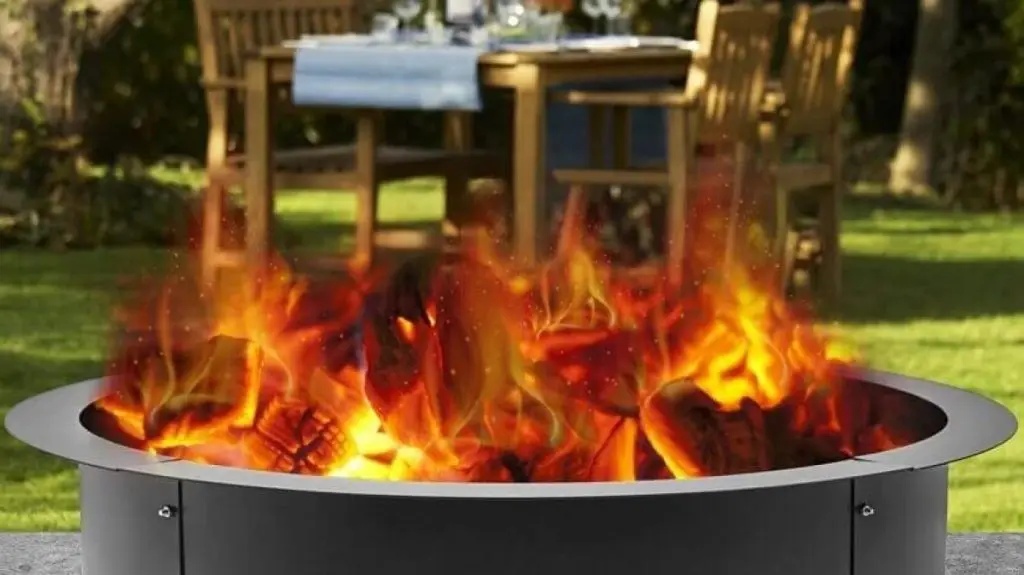
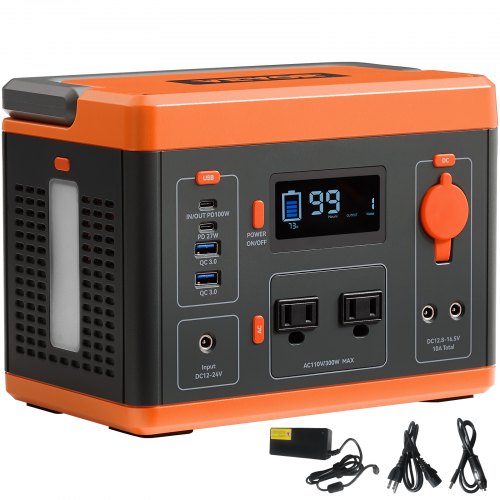
 Arabic
Arabic Danish
Danish Dutch
Dutch English
English Finnish
Finnish French
French German
German Hungarian
Hungarian Italian
Italian Norwegian
Norwegian Portuguese
Portuguese Romanian
Romanian Russian
Russian Slovak
Slovak Spanish
Spanish Swedish
Swedish